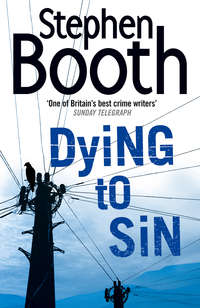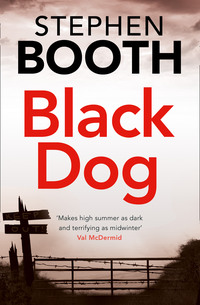
Полная версия
Scared to Live
He felt uncomfortable for the victim, lying there on the floor. He knew nothing about Rose Shepherd, but he was sure she’d have hated anyone to see her like this. Her grey hair was dishevelled and fell in loose strands across her face. Her mouth had fallen open, and a trail of saliva had dried on her lips. Crime-scene photographs would show up a small rip in the victim’s nightdress and the white, crinkled flesh on the back of her thighs. The flash would cruelly expose the crow’s feet around her eyes, the loose skin at her neck, the beginning of liver spots on the back of her hand where it clutched the rug. Death did nothing for the appearance. But this was the way Miss Shepherd would be immortalized.
Kessen walked back to the bedroom and looked out on to the garden. ‘Correct me if I’m wrong,’ he said, ‘but there’s quite a bit of money tied up here, isn’t there?’
Abbott nodded. ‘A few hundred pounds for that intercom unit alone, I’d say. Probably double that for the installation of the gates.’
‘So it looks as though the victim really needed to know who was calling on her, doesn’t it?’
‘We’ve got house-to-house under way. But so far, everyone we’ve talked to is in agreement on one thing: Miss Shepherd never got any visitors. Apart from the postman – and even he didn’t get past the gates.’
‘No visitors at all?’
‘So they say.’
‘No. We just haven’t talked to the right people, yet,’ said Kessen.
‘Why?’
‘Well, that can’t be true, can it, Paul? You’re a property owner. What about all those folk who come to your address? The refuse men to collect your wheelie bin, the tanker driver to deliver your central heating fuel, the man who reads your electricity meter? No one can build a moat around their property and keep everyone out. It isn’t possible these days. Life has a way of intruding in all sorts of ways.’
‘Rose Shepherd does seem to have been a very solitary person, though. She lived on her own, and she didn’t mix with the neighbours, by all accounts. No one in Pinfold Lane knows who Miss Shepherd’s next of kin could be, or whether she had a family at all. We found an address book near the phone downstairs, but we can’t see any obvious relatives listed. In fact, the entries seem to be all routine stuff – doctor, dentist, a local garage.’
‘There must be something in the house to give us names. A diary, letters …?’
‘Well, we’re still looking. But it seems odd. There ought to be somewhere obvious for her to keep information like that. Why make us hunt for it?’
‘Try a phone bill. See what numbers she called most often, who was on her Family and Friends list.’
‘Yes, sir.’
‘How long had she lived here? Do we know that?’
‘The neighbours say about a year. Miss Shepherd moved in on her own, with no sign of a husband or anything. No secret lover sneaking in through the back door either.’
‘If the lover was secret, no one would know about him, surely?’
‘This is a village,’ said Hitchens, as if that explained everything.
‘You know, this is a large house for one woman living on her own.’
‘She doesn’t seem to have employed anyone, not even a gardener or cleaner. The lady at the next property down the lane says Miss Shepherd did some gardening herself now and then. She used to see her from her bedroom window, pottering about on the other side of the hedge.’ He looked up at Kessen. ‘See what I mean about a village? Who needs surveillance?’
‘But the house?’ Kessen brushed at a cobweb. ‘It looks as though it could have done with the attention of a cleaner now and then, to be honest.’
‘Presumably Miss Shepherd was less keen on housework than gardening.’
Kessen turned back to Abbott. ‘What about security? We know she had an intruder alarm.’
‘A top-of-the-range monitored system, too. She wanted to be sure that there would be a police response if she had an intruder. Motion sensors – so possibly an audio connection or a CCTV camera somewhere. We can check with the monitoring centre whether she ever had any alerts. This is more than a DIY job, or a bells-only system.’
‘Doors and windows?’
‘Five-lever mortice deadlocks, and hinge bolts.’ Abbott tapped the fanlight. ‘Laminated glass – almost impossible to break in the normal way. Oh, and there’s a restrictor on the inside of the letter box to stop anyone reaching through to release locks and bolts. She didn’t use the letter box on the door, though. There’s one on the gates.’
‘Probably the gates came later.’
Abbott moved around the room. ‘We’ve got double glazing, key-operated window locks. Venetian blinds, so she could stop people looking in without blocking the light. Outside, I noticed there were bulkhead lights as well as the floodlights fitted with motion detectors.’
‘She seems to have had good advice on security.’
‘There’s even a shredder next to the desk here. She wasn’t taking any chances.’
‘She knew about bin raiding, then. Not everyone has that sort of nous. I wonder where she learned about the risk of identity theft.’
‘What about that Notts exercise a while ago? Wasn’t that in the local papers?’
‘Could have been.’
Cooper remembered that, too. Nottinghamshire Police had decided to take the contents of hundreds of household bins and analyse them to see what people were throwing away. A messy job, but interesting results. They found nearly ninety per cent of domestic rubbish contained information that would be helpful to fraudsters. Most of the bins had the full name and address of someone in the household, and many had details of bank account numbers and sort codes. Some had the full set. Helpful? That was more like making someone a Christmas present of your bank account. PC Judson would be horrified.
‘The one thing we’ve found is her passport,’ said Hitchens.
‘A UK passport?’
‘Yes. Rose Ann Shepherd, British citizen, born 1944 in London …’ He flicked through the pages. ‘No stamps.’
‘What about an address?’
‘Your address doesn’t appear in your passport.’
‘No, but most people give a next of kin. A friend or relative, anyway – maybe two.’
‘You’re right.’ Hitchens turned to the back page again. ‘Nope, not in Miss Shepherd’s case.’
‘No one she wanted informed in the event of an accident?’
‘I guess not. You know, this passport looks almost unused to me. Mine has got a bit creased at the spine and started to turn up at one corner.’
‘Well, that would explain why there are no stamps.’
‘Not necessarily. It just means she hasn’t been outside Europe with it. Or rather, outside the Schengen area. You don’t get stamped moving between Schengen countries.’
In her passport photograph, Miss Shepherd was smartly turned out. Her hair was a darker shade of grey, swept back in a business-like manner to match a white blouse, discreet ear studs and a hint of make-up. She had sharp blue eyes and a direct gaze, with the faintest of smiles at the camera.
Hitchens took a call on his mobile. ‘OK, that’s great. Thanks.’ He turned to Kessen. ‘There was a Vauxhall Astra seen in the village in the early hours of Sunday morning. It doesn’t belong to any of the residents, so far as we can tell. One witness is almost sure she’s seen it in the village before – and the previous occasion was late at night, too.’
‘Any details?’
‘Blue.’
‘Dark blue? Could have been black in the dark?’
‘Nope. Light blue, seen under the streetlight near the phone box. No reg, but it probably started with an X, so it wasn’t a new model.’
‘You know, we need the media to come on board early in this one, Paul. There are no obvious leads from the house. We’ve got to get appeals out to locate the driver of that Astra, and anyone who had contact with Rose Shepherd in the last forty-eight hours. No – the last two weeks. God, I don’t know – any contact with her, full stop.’
Cooper looked up, surprised to hear the DCI getting even a little bit rattled in public.
But he could see what was bothering Kessen. The first twenty-four hours were the vital period after any murder. If you didn’t have a strong lead within that time, you were destined for a long drawn-out enquiry – and the odds were against bringing the case to a successful conclusion. This murder might be forty hours old already, according to the ME, and there wasn’t a single lead in sight.
But why didn’t someone miss Rose Shepherd? That was the question the DCI had asked earlier. And it was a good question.
‘You know, there’s absolutely no sign of an intruder being in the house,’ said Kessen. ‘Apart from this open window, which shows no traces of having been forced. No tool marks, no damage. Right, Wayne?’
Abbott had his phone to his ear. ‘And no fingerprints either,’ he said. ‘I just got an update. The only prints we found on the window are a match for the victim’s – and they were on the inside.’
‘And every other window in the house is locked down tight. Why wouldn’t this one be locked, too? Can anyone suggest an answer to that?’
‘Yes,’ said Hitchens, looking anxious. ‘Because someone used this window to get out of the house. I don’t know how he got in – I can only guess the victim let him in through the front door. But he must have gone out this way.’
‘We’re on the first floor. Did he clamber down the drainpipe?’
‘Probably.’ Hitchens looked out of the window. ‘Actually, there isn’t a drainpipe. Not within reach.’
‘A nice dense ivy, then? Russian vine?’
‘Nothing. It’s a blank wall …’ Hitchens hesitated. ‘He must have jumped.’
‘From this height?’
‘Er, yeah.’
‘In that case, Paul, I expect you’ll find the intruder’s prints on the window frame, perhaps some fibres from his clothes on the stone ledge. There’ll be some pretty deep footwear impressions in the ground down below, where he landed. Oh, and you’ll be looking for a suspect who ran away with two broken legs and a cracked spine.’
Hitchens sighed. ‘So what’s the alternative?’
Kessen joined him at the window. ‘There’s only one other possibility. That there never was an intruder in this house. The victim was shot from outside.’
Hitchens stared. ‘From the garden?’
‘No, look – the angle is completely wrong. The shots must have come from the field.’
‘But the window – why was it open?’
‘Wayne said there were no prints on the outside. What about the inside?’
‘Just the victim’s.’
‘So that’s pretty clear, isn’t it?’ said Kessen. ‘The victim opened the bedroom window herself. And someone waiting in the field shot her.’
‘Jesus,’ said Hitchens.
Kessen turned back and addressed the room in general. ‘Close off that road up there, seal the gateway, and get the SOCOs and the search teams into the field. That’s where our gunman was.’
Before the action moved outside, Cooper took a chance to study the interior of the house. One of the first things that had struck him was the amount of dust. Of course, there had been no cleaner. And Miss Shepherd had only done the minimum amount of housework herself, by the looks of it. A bit of attention to the sitting room, the kitchen, the bathroom, and her bedroom.
But there were other rooms that seemed to have lain untouched. Opening the door into a guest bedroom set balls of dust rolling across the carpet, spiders scurrying away from the movement. The curtains were closed in here, so Cooper switched on the light. Fine particles of dust hung in the air, swirling in the draught from the landing.
Most people had no idea where the dust in their homes came from. As far as the average householder was concerned, it might as well come from the Moon, floating down from the sky every night and settling on available surfaces like drifting snow. An inconvenience, perhaps, but something natural and inert that was just part of the atmosphere, like oxygen.
But Cooper knew different. It was one of those facts that he’d learned as a teenager and never forgot. He knew that all human beings in the world shed thousands of dead skin cells every hour, an entire layer of skin over three days. That was what hung in the air and danced in a shaft of sunlight from the window. That was what lay on the shelves and gathered in restless clumps under the bed, or shrouded the junk in the attic. Ninety per cent of the dust in any house consisted of dead human skin.
Also, the décor in the sitting room struck him as odd. Off-white and charcoal grey, almost no colour. It seemed a bit modern for a house of this age, let alone for the sort of woman that Rose Shepherd seemed to have been. As far as anyone could tell, anyway.
Hitchens stuck his head round the door. ‘Ben, we’ve brought the postman back to the scene. Go and get a statement from him, will you? He’s fretting about getting back on his rounds.’
‘Right, sir.’
Cooper took a last look at the charcoal grey wallpaper around the fireplace. It showed up the dust badly, and it was undisturbed by finger marks. And then he remembered another fact he’d learned about house dust. Each speck of it carried tens of thousands of dust mites. Right at this moment, they were busy feeding on those dead skin cells.
6
‘Years ago, I used to work on a delivery round out Leek way,’ said Bernie Wilding when Cooper found him sitting in his red mail van. ‘I saw those wallabies out there about as often as I saw Miss Shepherd in Foxlow.’
‘The wallabies?’
Cooper laughed. Most rumours of exotic animals surviving in unlikely parts of the country were rubbish. But sometimes the creatures turned out to be real, like the scorpions on the London Underground – or the wallabies of the Roaches.
‘Did you really see the wallabies?’ he asked.
‘Only as an odd shape in the distance once or twice. I was never quite sure whether I was looking at a wallaby or a hare, really. But I always told everybody I’d seen the wallabies. Well, you do, don’t you?’
‘Yes, I would too.’
It was one of Cooper’s genuine regrets that he’d never seen a wallaby, despite his thirty years in the Peak District. No one who lived or worked on the western fringes of the national park doubted they existed. Plenty of drivers had seen them, and a few had run one over at night on some remote road. The original animals had escaped from a private zoo during the Second World War, and bred on the moors. According to the stories, a yak escaped at the same time. But the last yak sighting was back in the fifties. Pity, really.
‘Too late now, I reckon,’ said Wilding.
‘So they say. Too many people and dogs invading their habitat.’
‘Oh, aye. And too much traffic. People have killed them off, when the bad winters couldn’t.’
Cooper thought he’d probably passed the test. Some of his colleagues would have had no idea what Bernie was talking about. But he’d proved his credentials as a local.
‘What about Miss Shepherd? You saw her often enough and at close enough range to recognize her, didn’t you?’
Wilding screwed his face up thoughtfully. ‘You know, the few times I did catch a glimpse of her, she always seemed to be wearing a headscarf, or something that hid her face. I could never be entirely sure it was her. Not so that I could absolutely swear to it, you understand?’
‘So you don’t think you’d be able to identify her, Mr Wilding?’
‘Not for certain. Sorry.’
‘You spoke to her, though, didn’t you? What did she sound like?’
‘Well, I reckon she had a bit of an accent,’ said Wilding. ‘But I couldn’t really place it. I didn’t speak to her that often, and even then it wasn’t to hold a conversation. Most often, it was through that intercom thing on the gate. And, to be honest, I wouldn’t recognize my own mother speaking through one of those.’
‘Did you ever see anyone else coming or going from Bain House?’
‘No, never.’
‘Any cars parked there?’
‘Just Miss Shepherd’s. It’s a Volvo, I think.’
‘And these gates were always closed, as far as you know?’
‘Always. She kept everyone out, including me.’
‘One last thing,’ said Cooper. ‘What was it you brought for her this morning?’
‘Oh, there was a package. It was a bit too big to get in the letter box. Can I give it to you?’
‘Yes, please. I’ll let you have a receipt.’
Wilding handed him a small parcel about nine inches long. ‘Miss Shepherd never got much mail. I hope it was nothing to do with what happened to her.’
‘Well, it was the reason she was found today, instead of in a week’s time.’
By the time Diane Fry arrived in Foxlow, there was no room for anyone to park anywhere near Bain House. She had to leave her Peugeot on the roadside close to a stone wall and walk to the RV point. Cooper met her near the gates as he was clearing the way for Bernie Wilding to get his van out.
‘Can you bring me up to speed, Ben?’ she asked.
‘Sure. I’ve made notes.’
‘I thought you would have.’
Cooper ran through the details. Fry listened carefully, finding nothing to fault him on. He thought he’d done pretty well, considering he hadn’t been at the scene much longer than she had herself.
‘She sounds like a bit of a recluse,’ said Fry when he’d finished.
He wondered if Fry felt the same slight shiver of recognition that he did at some of the details. There were times in many people’s lives when they went to great lengths to avoid contact with anyone else. It wasn’t so unusual. Just a bit extreme, perhaps, in Rose Shepherd’s case.
‘Actually, I used to know a lady who was a real recluse,’ he said. ‘Old Annie, we called her. When I was a child, she lived in an old cottage near the farm. She must have been there for donkey’s years, because the place was getting very run down. But she didn’t seem to have any relatives – or if she did, they never bothered to visit her. Annie stayed in her house watching TV and listening to the radio, much like Miss Shepherd must have done.’
They began to walk towards the house. The front door stood open, officers still coming and going with bagged items for examination.
‘No one visited Annie at all?’ asked Fry.
‘Well, Mum used to call on her occasionally to see if she was all right. A few times a year, she was invited to our house. Boxing Day, that was a time when we always had to have her round. As kids, we used to dread her coming.’
‘Why?’
‘Annie was one of those lonely people who didn’t speak to anyone for weeks on end, then couldn’t help talking far too much when she finally got into company. It was as if she had to prove to herself that she could still hold a conversation, that somebody would listen to her when she was speaking. I suppose she needed to be sure that she still existed in other people’s eyes.’
‘Were you psychoanalysing people even then?’ said Fry. ‘Yes, I bet you were. I can just see you as an eight-year-old Sigmund Freud.’
But Cooper took no notice. He knew her well enough by now. She made those remarks out of a sort of defensive instinct sometimes. In fact, whenever he talked about vulnerable and lonely people, it seemed.
‘Of course, the result was that everyone tried to steer clear of Old Annie,’ he said. ‘It was probably why her relatives never visited her, and why even the postman kept his van door open and the engine running. Mum always said she had trouble getting away from the cottage once she was inside.’
‘No one likes being trapped by an old bore.’
‘Yes, I suppose Annie was a terrible old bore, but it was more than that. When I was a small child I found her quite frightening. She had that slightly hysterical tone to her voice that always makes people nervous. So people went out of their way to avoid her.’
‘God help me, but I hope I die before I get like that.’
They found Hitchens and Kessen at the edge of the field backing on to the garden of Bain House. The DCI seemed to be sniffing the air, trying to detect the scent of his suspect, like a dog. Wayne Abbott was walking across the field towards them, his boots crunching through the ridges of ploughed soil.
‘I was always taught to go around the edge of a field so as not to damage the crop,’ he said. ‘But I’m making an exception today, because the edge of the field is exactly where your tyre marks are.’
‘The tyre marks of what?’
‘A black car possibly, but a dark colour certainly.’
Kessen looked surprised, and perhaps a bit irritated. ‘Why do you say that?’
‘Well, I’m betting if they drove openly across this field they were hoping that residents living nearby would think they were out lamping.’
‘Lamping?’
‘That’s when people go out into the countryside to shoot animals at night. Lampers use a bright light to dazzle their quarry.’
‘Yes, I know about that – rabbits and such like.’
‘Well, not just rabbits. Badgers, deer, sheep – you name it. Anything that’ll stand up and be shot at.’ Abbott’s eyes flickered around the group. ‘DC Cooper will tell you about it. I’m sure he must have done a bit of lamping himself.’
‘Well …’ began Cooper. But no one was listening to him.
‘But the thing is,’ said Abbott, ‘if local people thought somebody was out lamping that night, they probably wouldn’t have bothered to dial 999, even when they heard shots.’
‘You’re kidding.’
‘It’s different in the country – you get used to hearing gunshots. In the city, someone might call the police, but out here you wonder how many brace they’ve potted.’
‘I understand that. But the colour of the vehicle …?’
‘Well, you wouldn’t go lamping in a white car, would you? You want your target to focus on the light, not on the paintwork of your bonnet.’
‘Nothing else, apart from the tyre marks?’
‘Nope. I was hoping for some shell casings. A brass casing could give us some prints, or there might be marks left by the weapon’s extractor or firing pin. But there’s nothing here that we can see.’
‘All right. Thanks.’
‘So it looks as though the suspect didn’t bother going into the house. Clever.’
‘Clever?’
‘Well, it makes it more difficult for us. We always have a better chance of coming up with something from a closed scene. Like the bedroom, for instance. But a ploughed field? And two days after the incident? Better start praying for a miracle.’
Kessen stared at the house. ‘All right, it was clever. But I wonder what the shooter did to get Rose Shepherd’s attention.’
‘What do you mean?’ asked Hitchens.
‘Well, if he made the hit from the field, he must have found some way to get his victim to the window. I can’t believe he was prepared to sit out here all night on the off-chance that she’d decide to get out of bed and take a look at the stars.’
‘A phone call, I reckon,’ said Hitchens. ‘It’d be easy enough to phone her on a mobile from the car.’
‘Yes.’
‘It’s starting to look like a professional job, isn’t it?’
‘I’m afraid so.’ Kessen nodded. ‘Yes, he could easily have phoned Miss Shepherd and woken her up. But what did he say to get her to come to the window? What could he have said that would make her walk straight into his sights?’
While Abbott organized a detailed search of the field, Cooper took the chance to report what the postman Bernie Wilding had told him about never seeing Miss Shepherd’s face clearly.
‘I could understand it if she was physically disfigured,’ said Hitchens. ‘If she was a burns victim, or something. That would explain why she never went out, and didn’t want people to see her.’
‘But she wasn’t disfigured, either in real life or in her passport photo. How old is that passport? When was it issued?’
‘Issued May 2000. Expires 2010.’
‘What about motive?’ asked Fry. ‘Do you think someone in the village might have had a grudge against her?’
‘If she didn’t have contact with anyone in the village, how could someone have a grudge against her?’
‘Well, I don’t know. Maybe that’s why she didn’t have contact with anyone. We don’t know anything about her history, so we can’t guess. Where do we start?’







